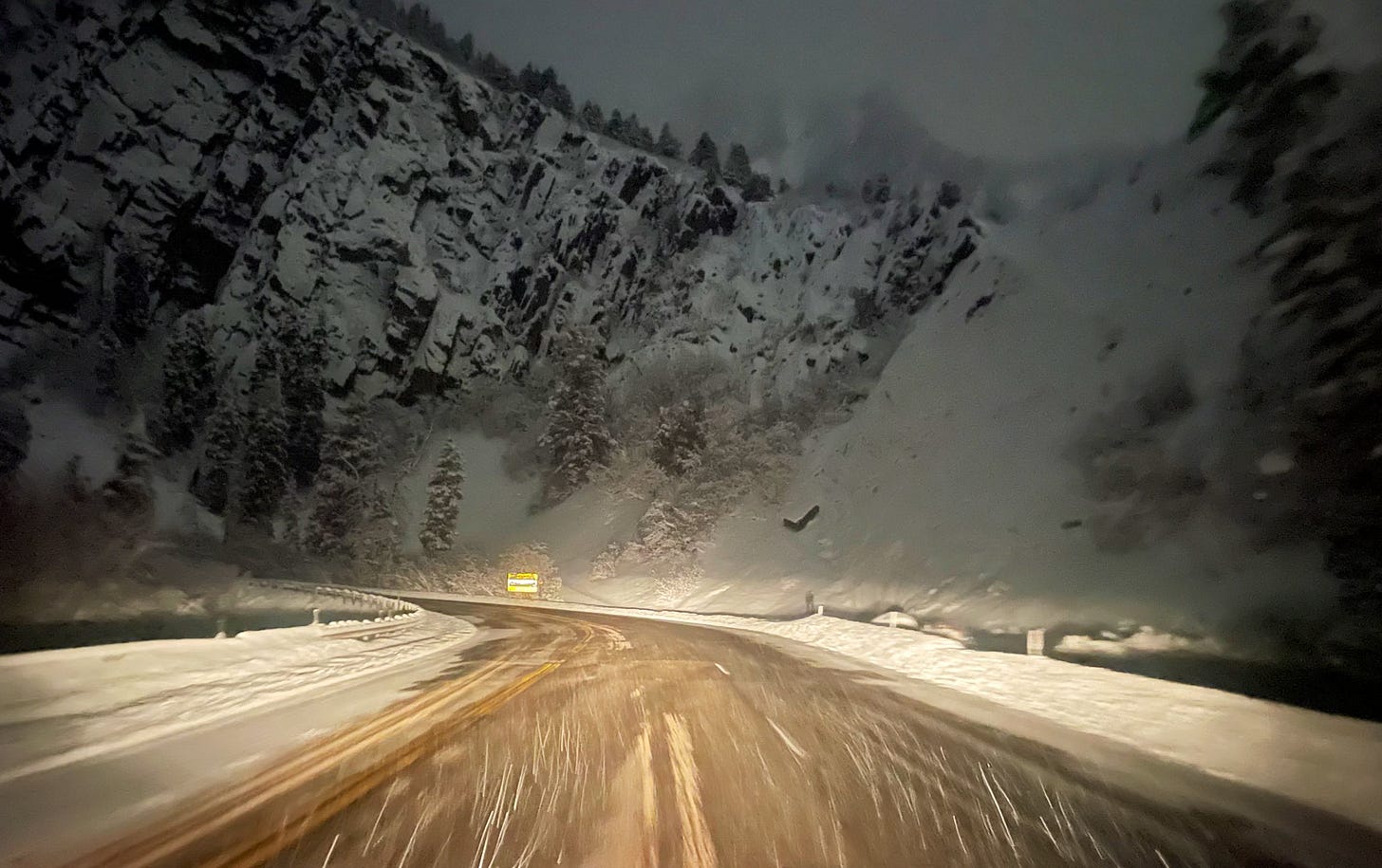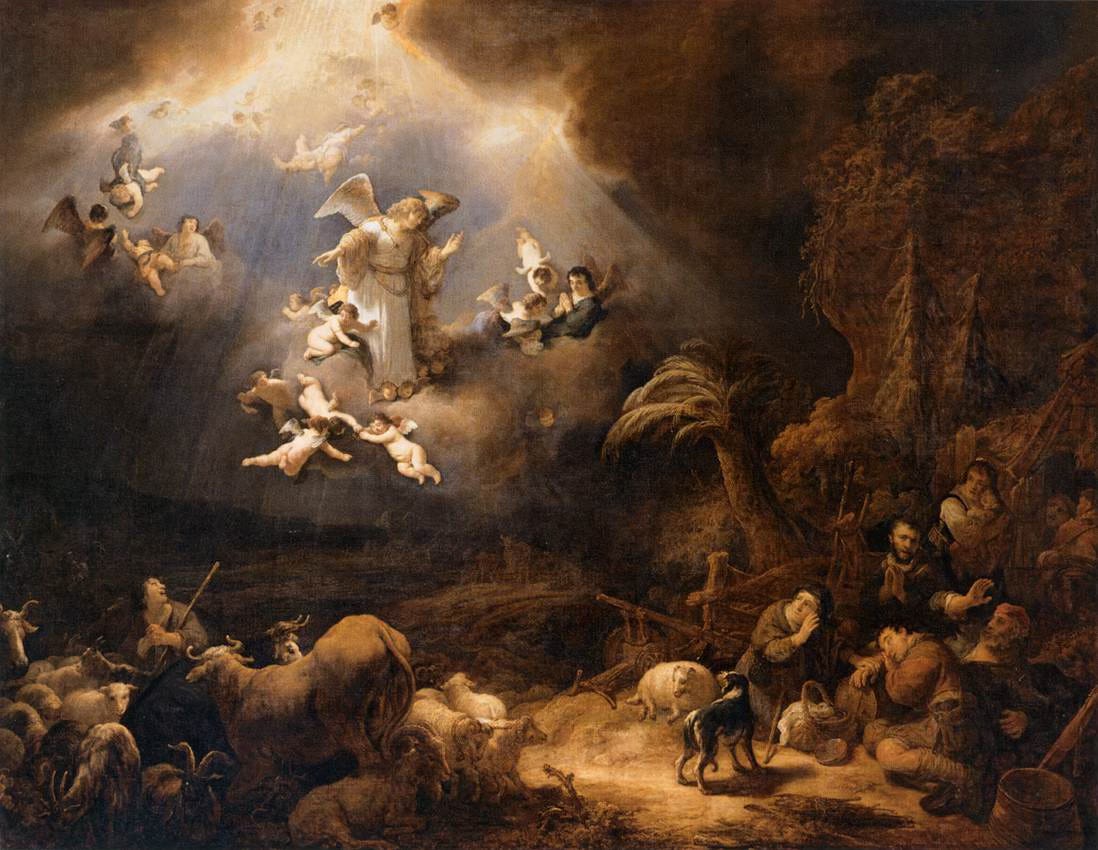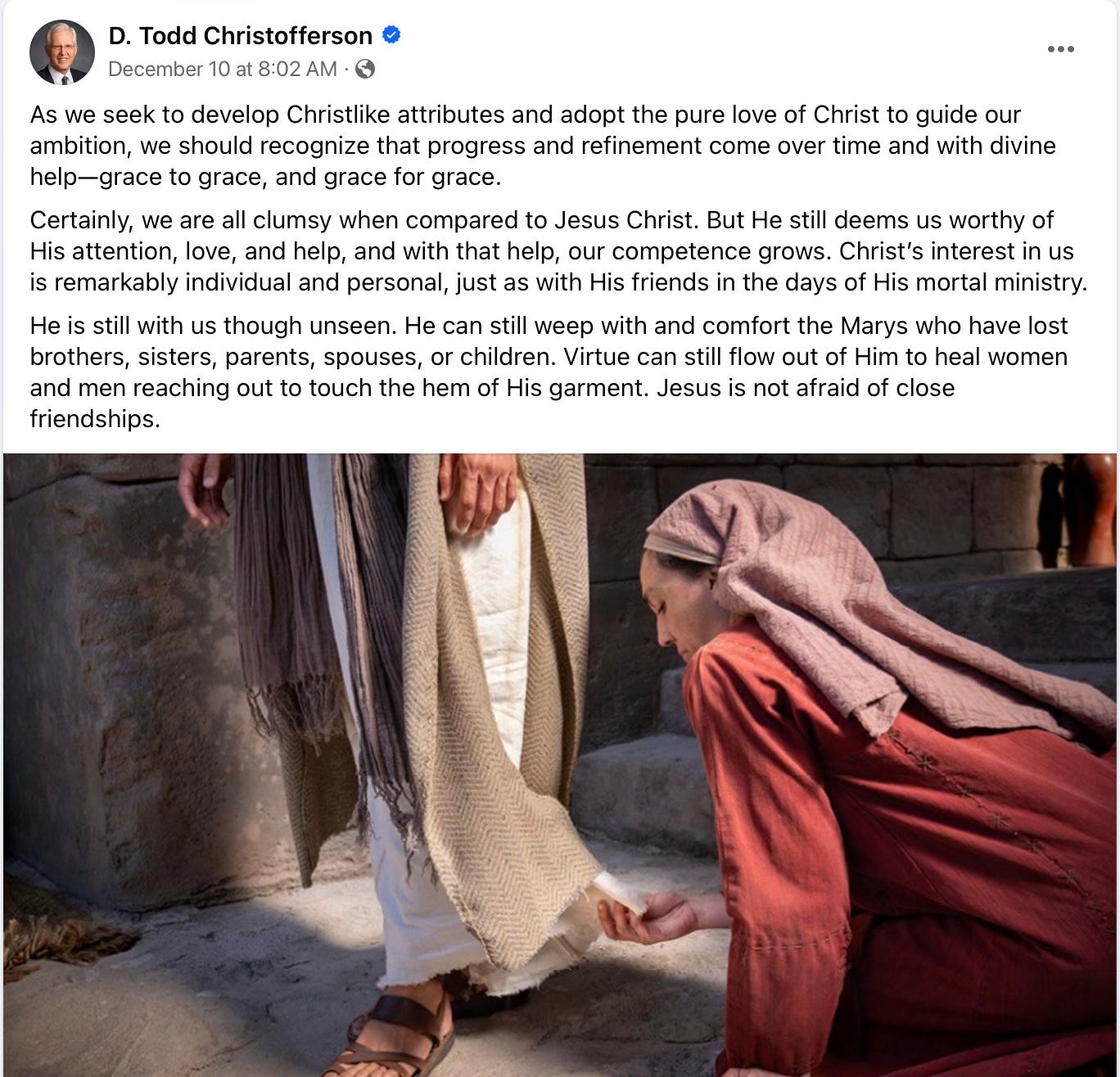“One thing…of more importance than they all”
Little thoughts about what matters most
It was sometime in January. My friend Al and I had decided, on a whim, to drive from Provo, Utah to Tempe, Arizona where we’d served together as missionaries to visit our mission leaders and other missionaries. In checking the map (a real paper one!) it looked like we could save some time by driving a more direct route on US 89 instead of taking I-15 to Las Vegas and then heading southeast toward Phoenix. We paid no attention to the weather forecast, the first of several consequential mistakes.
We left late on a Friday night and made our way south through the dark canyons. There was very little traffic. After a couple of hours it began to snow. We were driving my well-worn Honda and didn’t have any chains or snow tires. As visibility got worse, we began to talk about whether or not we should keep going.
About ten miles north of Salina we began a long, slippery descent. The road dropped off into steep gulleys on either side of the road. Occasionally we saw glimpses of rocky canyons falling away just a few feet from where we drove.
I don’t remember who was driving when it happened. Suddenly our little car began sliding out of control, back and forth, until - terrifyingly - we left the road, plunged down an embankment, and came to a violent stop, the snow up to the tops of our tires. We were hopelessly stuck.
I can still remember how quiet it was as we sat there, shaken, realizing how much worse things could have been for us. As we climbed out and looked back up the road, we could still see our tracks in the snow down the side of the embankment. After a brief and futile attempt to unbury the car, I made my way up to the snow-slick highway in hopes of flagging someone as they drove past. Minutes later a semi truck came into view. As it approached I tried to get the driver’s attention, but he seemed not to see me. Without thinking (a recurring theme at this point) I started to run after the truck.
Impossibly, he slowed to a stop. As I ran down that canyon, through the snow, in the dark, I felt a voice not my own teaching me something I’ve never forgotten.
“I am with you here. I protected and preserved you. Even when you forget to ask for help, I’m helping you. You are loved.”
************
Over 80 years before the birth of Christ, a Book of Mormon prophet named Alma was prophesying of future events when he shared the following:
For behold, I say unto you there be many things to come; and behold, there is one thing which is of more importance than they all—for behold, the time is not far distant that the Redeemer liveth and cometh among his people.
Alma 7:7
“One thing…of more importance than they all.”
The birth, life, mission, and atoning sacrifice of Jesus Christ are the most important things that ever have or ever will happen on this earth. His teachings, Atonement, and resurrection have impacted and will yet impact the lives of every person ever born.
As we begin a new year and look forward to new opportunities and experiences, I have felt to share just a few of the many ways that the Savior’s Atonement, the “most important thing,” can bless us with hope, joy, and peace.
Infinite & Eternal
Here’s a question I’ve sometimes wondered about. How was it possible for people to exercise faith in Jesus Christ and repent of their sins before the Savior came to earth? How did that work? Wouldn’t He first need to atone for our sins before we could be forgiven of them through His cleansing blood? And yet we read of many, beginning with Adam, who had their sins remitted thousands of years before Christ was born.
Corianton, the youngest son of the prophet Alma, also wondered about this, and for a very personal reason. He had committed some serious sins and wanted to be forgiven and start over.
Here is what his father taught him:
And now I will ease your mind somewhat on this subject. Behold, you marvel why these things should be known so long beforehand. Behold, I say unto you, is not a soul at this time as precious unto God as a soul will be at the time of his coming?
Is it not as necessary that the plan of redemption should be made known unto this people as well as unto their children?
Is it not as easy at this time for the Lord to send his angel to declare these glad tidings unto us as unto our children, or as after the time of his coming?
Alma 39:17-19
What Alma is teaching his son here (as I interpret it, of course) is that the “infinite virtue” of the Savior’s atoning sacrifice extended in both directions in order to cover who would ever live, either before or after He came. If there was any possibility that He wouldn’t suffer and die for us, the eternal reach and transformative power of His Atonement would be null and void. It HAD to happen. In order to have faith in Christ we need to know that no matter what, He is there for us. When other sources of help fail us, the Savior is our firm foundation.
“There shall not any man be able to stand before thee all the days of thy life: as I was with Moses, so I will be with thee: I will not fail thee, nor forsake thee.”
Joshua 1:5
In moments where you or I may wonder if His power to forgive and heal reaches us, the answer is always and forever “yes!” We cannot fall beyond His grasp. We cannot sin beyond His capacity to redeem. But He cannot save us in our sins; only from them.
Intimate & Individual
"𝐒𝐨 𝐆𝐨𝐝 𝐭𝐡𝐫𝐨𝐰𝐬 𝐨𝐩𝐞𝐧 𝐭𝐡𝐞 𝐝𝐨𝐨𝐫 𝐨𝐟 𝐭𝐡𝐢𝐬 𝐰𝐨𝐫𝐥𝐝 — 𝐚𝐧𝐝 𝐞𝐧𝐭𝐞𝐫𝐬 𝐚𝐬 𝐚 𝐛𝐚𝐛𝐲. 𝐀𝐬 𝐭𝐡𝐞 𝐦𝐨𝐬𝐭 𝐯𝐮𝐥𝐧𝐞𝐫𝐚𝐛𝐥𝐞 𝐢𝐦𝐚𝐠𝐢𝐧𝐚𝐛𝐥𝐞. 𝐁𝐞𝐜𝐚𝐮𝐬𝐞 𝐇𝐞 𝐰𝐚𝐧𝐭𝐬 𝐮𝐧𝐢𝐦𝐚𝐠𝐢𝐧𝐚𝐛𝐥𝐞 𝐢𝐧𝐭𝐢𝐦𝐚𝐜𝐲 𝐰𝐢𝐭𝐡 𝐲𝐨𝐮. 𝐖𝐡𝐚𝐭 𝐫𝐞𝐥𝐢𝐠𝐢𝐨𝐧 𝐞𝐯𝐞𝐫 𝐡𝐚𝐝 𝐚 𝐠𝐨𝐝 𝐭𝐡𝐚𝐭 𝐰𝐚𝐧𝐭𝐞𝐝 𝐬𝐮𝐜𝐡 𝐢𝐧𝐭𝐢𝐦𝐚𝐜𝐲 𝐰𝐢𝐭𝐡 𝐮𝐬 𝐭𝐡𝐚𝐭 𝐇𝐞 𝐜𝐚𝐦𝐞 𝐰𝐢𝐭𝐡 𝐬𝐮𝐜𝐡 𝐯𝐮𝐥𝐧𝐞𝐫𝐚𝐛𝐢𝐥𝐢𝐭𝐲 𝐭𝐨 𝐮𝐬? 𝐖𝐡𝐚𝐭 𝐆𝐨𝐝 𝐞𝐯𝐞𝐫 𝐜𝐚𝐦𝐞 𝐬𝐨 𝐭𝐞𝐧𝐝𝐞𝐫 𝐰𝐞 𝐜𝐨𝐮𝐥𝐝 𝐭𝐨𝐮𝐜𝐡 𝐇𝐢𝐦? 𝐒𝐨 𝐟𝐫𝐚𝐠𝐢𝐥𝐞 𝐭𝐡𝐚𝐭 𝐰𝐞 𝐜𝐨𝐮𝐥𝐝 𝐛𝐫𝐞𝐚𝐤 𝐇𝐢𝐦? 𝐒𝐨 𝐯𝐮𝐥𝐧𝐞𝐫𝐚𝐛𝐥𝐞 𝐭𝐡𝐚𝐭 𝐇𝐢𝐬 𝐛𝐚𝐫𝐞, 𝐛𝐞𝐚𝐭𝐢𝐧𝐠 𝐡𝐞𝐚𝐫𝐭 𝐜𝐨𝐮𝐥𝐝 𝐛𝐞 𝐡𝐮𝐫𝐭? 𝐎𝐧𝐥𝐲 𝐭𝐡𝐞 𝐎𝐧𝐞 𝐰𝐡𝐨 𝐥𝐨𝐯𝐞𝐬 𝐲𝐨𝐮 𝐭𝐨 𝐝𝐞𝐚𝐭𝐡."
- 𝐀𝐧𝐧 𝐕𝐨𝐬𝐤𝐚𝐦𝐩
I wish I could say that since that harrowing night outside Salina, I have learned my lessons and no longer make mistakes, but of course that’s not the case. I’ve continued to do things I shouldn’t do, say things I shouldn’t say, and to want things I shouldn’t want. Even when I have known what is right, I have chosen what is wrong. Even when I have known what I should do, I’ve chosen not to do it.
One of my favorite chapters in the Book of Mormon is 1 Nephi 11. Nephi shares his vision of the tree of life and of the future birth and ministry of Jesus Christ. One of the reasons I love this chapter is because of the method the Spirit and later an angel use to teach Nephi. Eight times they use the word “Look!” Seven out of eight of those instances, “Look” is followed by an exclamation mark, as if to say to Nephi and to us, “This is a big deal. Pay attention! Remember this.”
When the Spirit first says “Look!” Nephi is shown the virgin “most beautiful and fair” who would give birth to the Savior. An angel then appears and asks Nephi a most important question: “Knowest thou the condescension of God?”
He is then shown glimpses of the Savior’s mortal ministry “going forth among the children of men.” This phrase is used several times, indicating that we should take notice of it. My interpretation of “going forth among” is that He gained perfect empathy through first-hand experience combined with divine imagination.
I don’t pretend to know all the reasons for why Nephi was taught in this way, but there is one thing I learn from it that gives me hope to keep trying. The Savior chose to know by experience what mortality would be like for each of us. Everything He did, from the moment He was born to His crucifixion on Calvary’s hill was His way of saying “no matter what you experience, you won’t ever have to go through it alone.”
Eugene England shared this important insight about what happened in Gethsemane:
Although we certainly can’t begin to understand all that happened in Gethsemane, especially how it happened, we can begin to feel the impact in our hearts of the divine love expressed there. Jesus Christ has somehow created the greatest possibility we can imagine: that our common lot of meaninglessness and alienation can be redeemed, that we might not suffer if we would repent. The God who planned and created and who directs our earth experience, who sent us here into tragic risk and suffering because only here could we experience further growth in his likeness, has sent his son, not only to guide and teach us through his revelations and his life, but to enter willingly into the depths of man’s life and redeem him—not offering solutions without knowing the pain of the problem and not setting prior conditions, but taking into himself the fullness of pain in all human estrangement in some awful awareness of the full force of human evil. Because the love is unconditionally offered and comes freely from the same person who gives us our standard of right and will eventually judge us, it has the power to release man from the barrier of his own guilt and give him the strength to repent.
Back to Alma’s phrase “there is one thing…more important than they all,” this is what I want to leave with you as the year ends and a new one begins: Knowing who Jesus is, what His mission was, how He feels about each of us, and what He is willing to do to help us make it back home is the most important thing we could know. Developing a close relationship with Him is the most important thing we could do.
Just a few weeks ago, Elder D. Todd Christofferson shared this message on social media:
“Jesus is not afraid of close friendships.” Don’t you love that so much?
I wish I had the words to say what I’m feeling. I want a better relationship with Jesus Christ. This is why I started The Bright & Morning Star. I’m discovering that there is a high price for that relationship. I want to say that I’m willing to pay it, but sometimes, that isn’t true. Knowing that the Savior has an eternal perspective and that He has felt what I’m feeling helps me to try, try again.
My “happy new year” prayer for anyone reading this is that in 2024, you will feel more of the Savior’s love and personal interest in the things that matter to you.








Thank you for sharing. You always say it right and bring in beautiful scriptures and quotes. I, too, want Christ in my life--“It is of more importance than they all.”